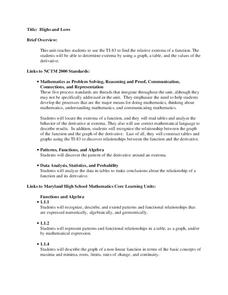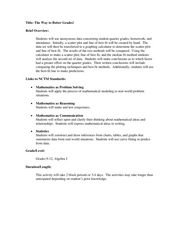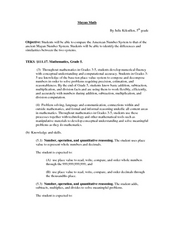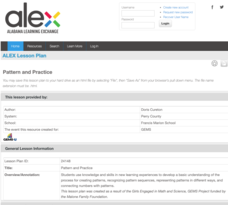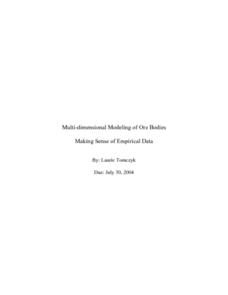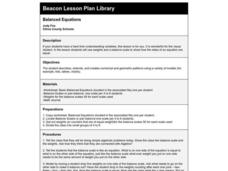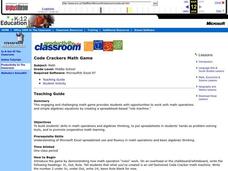Curated OER
Highs and Lows
Solve problems using integration and derivatives. By using calculus, learners will analyze graphs to find the extrema and change in behavior. They then will identify the end behavior using the derivatives. Activities and handouts are...
Curated OER
The Way to Better Grades!
Pupils collect and analyze data. In this statistics lesson, learners create a scatter plot from their collected data. They use, tables and graphs to analyze the data and mae decisions.
Curated OER
Are You Absolutely Sure of the Value?
Seventh graders develop an examineing of absolute value through real world situations. They develop an examineing of when absolute value can be used in a given situation.
Curated OER
Mayan Math
Fifth graders investigate the Maya's as mathematicians. In this Mayan math lessons, 5th graders work with the ancient Mayan numbering system by comparing it to the American Number System. They tell the differences and similarities...
Curated OER
Families of Functions
Students investigate families of functions. In this families of functions lesson, students discuss how changing a functions parameters affect its' graph. Students vary slope and y-intercepts of linear functions. Students stretch and...
Alabama Learning Exchange
Pattern and Practice
Young scholars learn how to make patterns. Students first display their prior knowledge of patterns before delving into the instructional activity. They complete a worksheet and participate in a web-based class activity. They work in...
Radford University
Parallel Lines, Transversals, and Angles: What’s the Connection?
Streets, bridges, and intersections, oh my! Parallel lines and transversals are a present in the world around us. Learners begin by discovering the relationship of the angles formed by parallel lines and a transversal. They then apply...
Curated OER
Multi-dimensional Modeling of Ore Bodies Making Sense of Empirical Data
Math scholars identify four different rock types in that strata and use this identification and data to construct a two dimensional geologic cross-section. They use data tables to construct a three-dimensional geologic cross-section.
Curated OER
Balanced Equations
Help your math class understand variables. This activity is for a visual learner. They will use weights and a balance scale to show how the sides of an equation are equal. Worksheet is included.
Illustrative Mathematics
Checking a calculation of a decimal exponent
In a writing prompt, learners are asked to check the calculation of a decimal exponent without a calculator. Use as an opener or assessment after studying fractional exponents. Requires a strong understanding of exponents and roots to...
University of Colorado
Distance = Rate x Time
Every year, the moon moves 3.8 cm farther from Earth. In the 11th part of 22, classes use the distance formula. They determine the distance to the moon based upon given data and then graph Galileo spacecraft data to determine its movement.
Curated OER
Code Crackers
Students work in teams creating and posing math rules and trying to guess them using a formula controlled worksheet they create with Excel. Student pairs take turns to see who can crack the other's code the fastest.
Curated OER
Clock Arithmetic and Cryptography
Students explore the concept of modular arithmetic and cryptography. In this modular arithmetic and cryptography activity, students use applets to explore modular arithmetic using a clock and Caesar Ciphers. Students exchange their...
Curated OER
Money Circulation: A Story of Trade and Commerce
Students are introduced to the meaning, symbolism, and value of the quarter. They determine the percentage of total monetary value held in quarters and graph the results. Students infer about the U.S. Mint's distrubution of coins. They...
Curated OER
End of the Year Math Terms
For this end of the year math test worksheet, 4th graders complete problems including addition, division, measurement, decimals, and more. Students complete 22 problems.
Curated OER
Impossible Graphs
Students practice plotting functions on the Cartesian coordinate plane while participating in a discussion about the Possible Or Not worksheet/activity. Students also use the Impossible Graphs worksheet to practice reading a graph,...
Curated OER
The Pythagorean Theorem Lesson 2
Learners discuss and review examples of the Pythagorean Theorem using a GSP, Geometer's Sketchpad, activity.
Curated OER
Design Patterns
Students extend and create patterns. Through a variety of activities, they discover patterns as they exist in math and their everyday lives. Students create a necklace that represents a pattern.
Curated OER
Box Plots
Young statisticians are introduced to box plots and quartiles. They use an activity and discussion with supplemental exercises to help them explore how data can be graphically represented.
Curated OER
Functions and the Vertical Line Test
Students examine functions and function notation. They use computer activities to discover how to graph functions, and conduct a vertical line test. Students describe spatial relationships using coordinate geometry.
Curated OER
Dividing by 3's
Third graders review and practice strategies for solving division problems. In this division by 3's lesson, 3rd graders play games, use an interactive whiteboard, create flashcards, and solve word problems.
Curated OER
Significant What?
Students define accuracy and precision, and differentiate between the two terms, apply the concepts of accuracy and precision to a given situation and correctly apply the concept of significant figures to measurement and mathematical...
Curated OER
Some Number Tricks
In this number tricks worksheet, students practice 4 number tricks. Students pick a number and perform various operations. Students always end up with the same number.
Curated OER
The Space Cadet's Laboratory: Using Electromagnetic Energy to Study Astronomy
Students build their own spectrophotometer to study light. In this physics lesson, students explain the dual nature of light. They calculate the angle of incidence and refraction using Snell's law equation.


